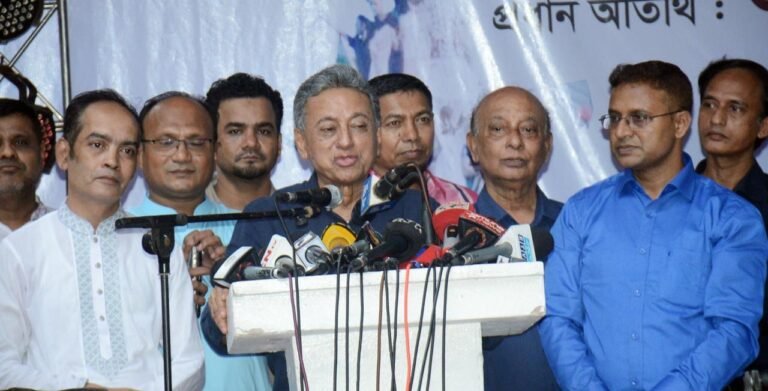BNP leader Amir Khasru Mahmud Chowdhury has said that journalists should not work for any political party, including BNP. Instead, they should speak for the people of Bangladesh. He was speaking at a rally in front of the Chattogram Press Club on Tuesday, marking the anniversary of the July-August mass uprising.
He said journalists who support dictatorship or stand for just one person or party are not real journalists. “They are like political workers,” he said. “Real journalists speak for the country and for the people.”
The event was part of a week-long programme organized by Chattogram Press Club. Amir Khasru visited a photo exhibition titled “July Uprising through the Camera.” Artists also performed songs about the movement.
The rally was led by Zahidul Karim Kachi, with other journalists and political leaders present, including Abul Hashem Bakkar and Abu Sufian.
In his speech, Ameer Khasru talked about the challenges journalists faced over the past 15 years. He said some of them supported an authoritarian regime and enjoyed its benefits, forgetting their real duty.
He also shared his own experience in jail during a time of political change. He said that when Sheikh Hasina left the country, he was in prison. The news came through a radio broadcast by the army chief. Many prisoners became emotional and excited, thinking the country was about to be free.
He described how the prison became tense and people wanted to break out. But he asked them to stay calm, saying he wouldn’t leave jail without them. This helped bring the situation under control.
Amir Khasru said thousands of people were arrested, tortured, and even blinded or crippled during the movement, but most of their stories were never told. He said their sacrifice helped keep the movement alive.
He also said BNP never protested for praise or credit. The movement was for freedom, democracy, and returning power to the people. He warned that if people divide again, dictatorship could return.
He said people today want education for their children, jobs, voting rights, and justice. Politics must change to reflect these hopes. Leaders must respect each other, even if they have different opinions.
He ended by saying that under Tarique Rahman’s leadership, they hope to build a new Bangladesh where people’s dreams will come true.
Other speakers also said the people had lost their rights under the current government and had to fight to get them back. They called for unity to make real change and to follow the 31-point reform plan announced by Tarique Rahman.
Journalists, student leaders, and women activists also spoke at the event, supporting the call for a free and fair Bangladesh.



